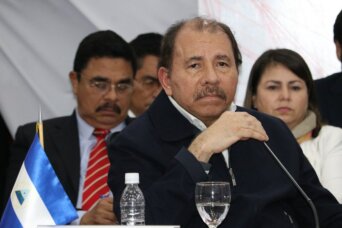- About
- Topics
- Picks
- Audio
- Story
- In-Depth
- Opinion
- News
- Donate
- Signup for our newsletterOur Editors' Best Picks.Send
Read, Debate: Engage.
| topic: | Election |
|---|---|
| located: | Nicaragua |
| editor: | Ellen Nemitz |
Just five months ahead of the upcoming presidential election, which will be held in November 2021, the Daniel Ortega administration is embarking on a series of arrests of important figures in the opposition, including five potential presidential candidates.
There have been at least 18 reported arrests so far - the number has been rising rapidly - and accusations of violation of prisoners’ rights, such as the right to receive visits from relatives and lawyers. More recently, the media has also become a victim of the government crackdown, with new barriers to freedom of the press put in place.
The weakness of Nicaraguan democracy is not new. Since the end of last year, the international community has been keeping an eye on the introduction of anti-democratic laws, which paved the way for the arrest and banishment of Ortega’s opponents. Ortega has been considered, both domestically and internationally, to be just as bad as the former dictator Anastasio Somoza, whom he helped oust in the 1970’s.
Politicians and journalists with different affiliations affirm that Ortega’s administration is, at best, in the process of becoming a dictatorship; in the worst case, it’s already one. According to Jose Miguel Vivanco, a human rights lawyer and director of the Americas Division at Human Rights Watch, there is no wonder about what is happening now in Nicaragua, since it is not a democratic system committing some error or exceeding some limits. On the contrary, he claims - it is a dictatorship revolving around one family who has the power to decide who gets to enjoy liberty and rights and who doesn’t.
The understanding that the ongoing situation is reasonably concerning has led the Organization of American States (OAS) to approve last week, with 26 votes in favor, a Resolution on the Situation in Nicaragua, which condemns "the arrest, harassment, and arbitrary restrictions placed on presidential candidates, political parties, and independent media.” Besides, the document highlights that the country has not implemented necessary and previously recommended reforms and other measures "to ensure the scheduled November 2021 elections are free and fair.”
The ambassador of Nicaragua, Luis Alvarado, attended the virtual meeting and expressed his objection to the fact that the states had gathered to discuss his nation’s politics, a move he regarded as an illegitimate intervention.
In May of this year, the International Crisis Group released a report titled The risks of a rigged election in Nicaragua, in which it classifies the modifications in the electoral scenario as urgent. "Without these, opponents and foreign powers are likely to brand the elections as rigged, potentially stirring renewed unrest and repression,” reads the document. In addition, it foretells that unfair elections - with "miscounted votes, harassment of opposition politicians and the prohibition of their parties” - may potentially lead the population to launch an insurrection, in addition to deepening the nation’s isolation and economic crisis.
With a lack of willingness on the part of the current government to undertake such measures, the opposition is still unsure about presenting candidates - despite the imprisonment of prominent politicians - or boycotting the election. Internationally, the debate relies on whether the external intervention is welcome and effective in guaranteeing the restoration of democracy in Nicaragua.
Still, Vivanco argues that the OAS Resolution will be very helpful in encouraging the countries of the region to unite in their demand of the United Nations, which is set to be delivered this week. “We want the Secretary-General, Antonio Guterres, to have a more visible leadership in this issue,” he stated.
Image: Cancillería Venezuela.

